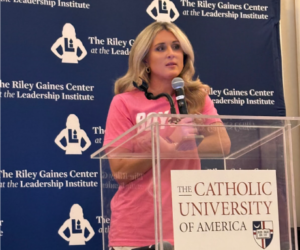Constitutional Scholar Gives Lecture on Unconstitutional Wars
by Rachel Gallagher
For 20-year-old college students, there has been only one model of wartime statesmanship they have experienced first-hand, one which places power largely in the hands of the president. However, on Wednesday night Louis Fisher, Ph.D. talked to students about modern statesmanship from President Truman to the present and the constitutionality — or a lack thereof — of Presidential actions leading up to and during times of war.
Students and faculty gathered in the Columbus School of Law to hear Fisher discuss the constitutional authority used by the president when engaging in war. Fisher is a specialist in Constitutional Law and is currently the Scholar in Residence at the Constitution Project. The lecture was the inaugural event for the the Center for the Study of Statesmanship at Catholic University.
“The funding was obtained in January and this was really our first event,” said Libby Federici, a sophomore art history major and politics minor. Federici is also the undergraduate fellow for the Center. “The event went really well. I was really impressed by the attendance — I’m always pleasantly surprised at the enthusiasm that CUA undergrads, especially politics students, have for events like this.”
Fisher began the lecture by outlining the current model of war power used by modern presidents and the constitutionality of the wars they’ve engaged in. The “framers,” as Fisher refers to the individuals who formed the United States Constitution, developed a constitutional model of war; the constitutional model relies on the quintessential American system of checks and balances to prevent just one person from declaring war. Though as the title of the lecture suggests, this ideal of the framers has become lost in modern American history.
Modern wartime statesmanship from President Truman at the end of World War II to the present has shifted to the “British Model,” Fisher explained. The idea of one head power delegating the actions of a country — particularly in relation to actions during times of war — is congruent to the model of statesmanship the framers worked to renounce in the 18th century as the nation was formed.
One major issue contributing to the assertion of unconstitutional wartime power is the “idealizing of the presidency” by scholars which then trickles into the media and even further into the Supreme Court. The gravitation toward an unfounded “inherent presidential power” is a common thread found from Truman onward; Truman, Nixon, George W. Bush, and Obama have all referenced an “inherent power” believed to be contiguous with the presidency, although all were struck down as they were deemed unconstitutional.
At the conclusion of the formal lecture, Fisher opened the floor for questions, garnering close to ten questions regarding the current state of unconstitutional wars and the understanding of presidential war powers as expressed by the media, particularly in the wake of last year’s presidential election.
“I found the whole talk very interesting,” said freshman Hispanic studies major Mercy Adoga. “I liked the way he outlined his talk and pulled quotes about what was actually intended versus what really happened with war powers. He included most of what I learned in history class which helped me better understand the talk.”







